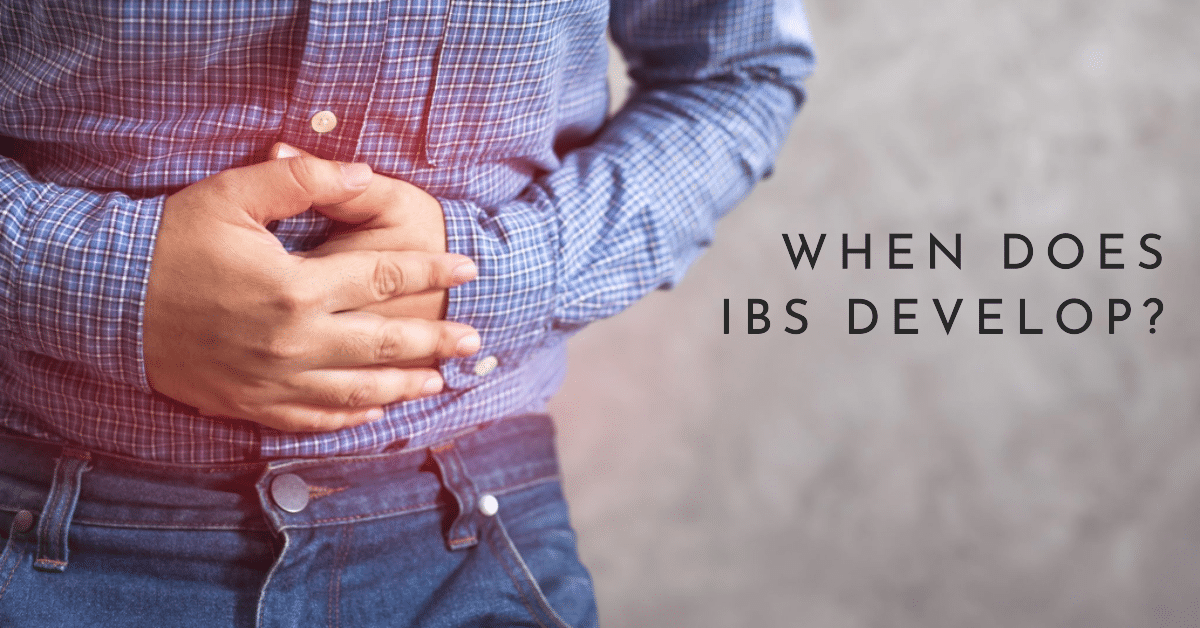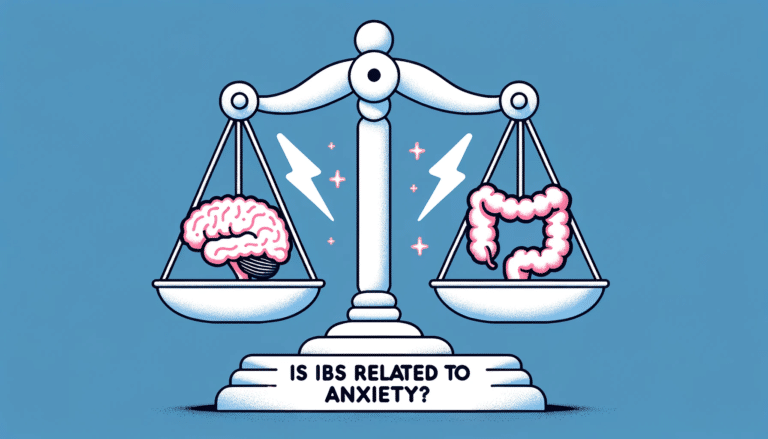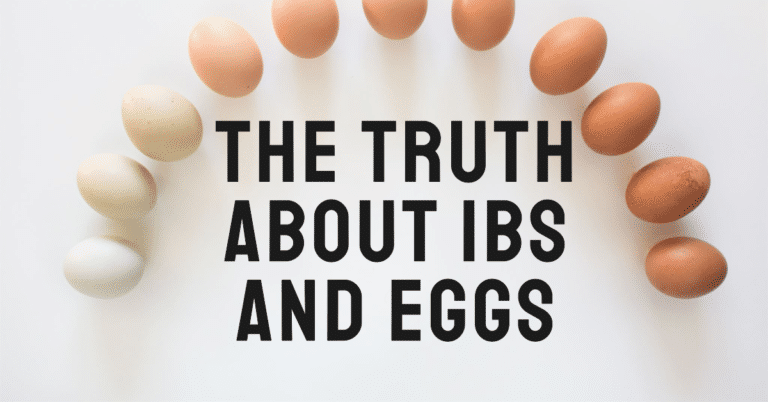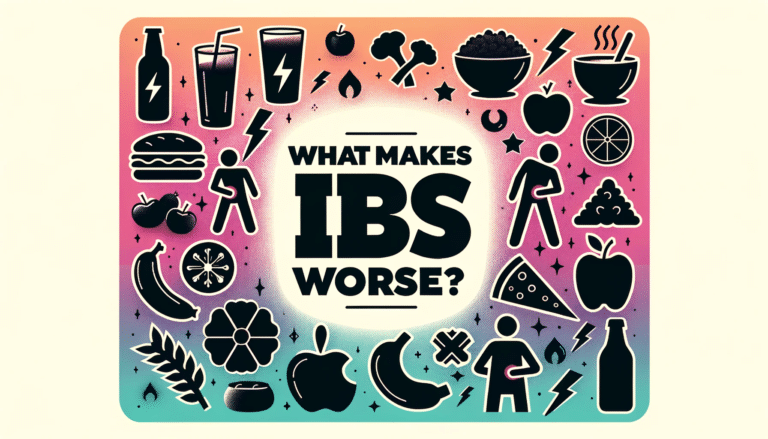When Does IBS Develop? Decoding the Mysteries of Irritable Bowel Syndrome

If you or a loved one suffers from irritable bowel syndrome (IBS), you may wonder: when does IBS develop?
While it can start at any age, IBS frequently surfaces in the late teens and early adulthood years.
Why then? What converges to spark IBS during this life stage? This blog post dives into the multi-layered factors that can ignite IBS in young people.
From family history to stress levels to changes in gut bacteria, we’ll unpack when IBS tends to develop and why.
Come away with a deeper understanding of this chronic condition’s origins and how to minimize its disruption.
Age of Onset: IBS Can Develop Gradually or Suddenly
For many, IBS comes on slowly during young adulthood. The average age of onset is 20 years old.
However, symptoms can appear at any age. About 50% of people with IBS report initial symptoms before age 35.
In some cases, IBS arises fairly quickly after an acute gastrointestinal illness. Bouts of food poisoning, traveler’s diarrhea, or other intestinal infection may damage the digestive tract and trigger lasting IBS symptoms.
Others develop IBS seemingly out of the blue without a major preceding illness. Symptoms often worsen gradually over weeks or months. Periods of remission may alternate with symptom flare-ups.
Exactly why IBS arises at a given time is unclear. However, several factors likely interact to finally push someone over the symptom threshold.
Factors Promoting IBS Development
Though the sequence of events is ambiguous, researchers have identified contributors that may promote IBS onset.
Let’s take a closer look at the potential reasons for developing IBS.
Gut Infection
As mentioned, acute gastroenteritis can instigate persistent bowel changes typical of IBS. About 10% of IBS cases follow a single bout of food poisoning or travelers’ diarrhea.
Severe infection may damage the digestive lining, alter gut microbes, and disrupt normal motility – laying the groundwork for chronic symptoms.
Brain-Gut Disconnection
For some, psychological distress arising during major life changes or crises may disrupt brain-gut communication.
The resulting bowel changes are then perceived as abnormal and painful, fueling anxiety and gut dysfunction.
Hormones
Puberty, menstruation, pregnancy, and menopause involve major hormonal fluctuations that can trigger IBS, especially in women.
The reasons for this link are unclear but may involve nerves, blood flow, or gut contractions.
Genetics
IBS tends to run in families. Carrying certain genes may predispose you to developing IBS when faced with a major gastrointestinal insult, infection, or hormonal shift.
Additional Factors In IBS Onset
While gut infection, hormones, genetics, and brain-gut disruption often play key roles, other influences can also contribute to IBS development.
Diet
A sudden change in diet or eating pattern could trigger the emergence of IBS. For example, increased intake of fat, caffeine, alcohol, or other IBS aggravators may instigate symptoms.
Alternatively, acute dietary deficiencies or malnutrition might impact bowel function.
Medications
Certain prescription drugs like antibiotics, metformin, acarbose, and NSAIDs are associated with IBS onset. They can alter gut flora, intestinal permeability, and motility. However, medication-induced IBS is temporary in most cases.
Physical Injury/Surgery
Abdominal surgery or physical trauma to the digestive tract may promote lasting IBS symptoms through inflammation, nerve damage, or scarring. Those with a history of appendectomy appear to have higher IBS risk.
Chronic Stress
Stress negatively impacts overall digestive health. Prolonged, severe psychological stress may disrupt gut-brain interactions enough to instigate IBS. Stress can also exacerbate underlying IBS symptoms.
Smoking
Cigarette smoking may increase IBS risk by harming gut microbes and motility. Nicotine also stimulates bowel contractions. Quitting smoking tends to improve IBS symptoms.
When Does IBS Typically Start?
In summary, IBS development depends on complex interactions between genetics, life events, diet, microbiome status, and additional factors. There are no hard-and-fast rules about IBS onset.
For many, symptoms of IBS begin gradually between ages 20-40, often following situations that disrupt normal digestive function like:
- Acute gastrointestinal illness
- Significant stressor or major life change
- Dietary changes
- Hormone fluctuations
- Abdominal surgery
In other cases, IBS arises more suddenly with no obvious trigger. Those with a family history of IBS may be predisposed to earlier development when faced with major gastrointestinal disturbances.
While IBS can start at any age, being aware of common triggers can help you identify potential causes if chronic bowel symptoms arise.
Keeping a symptom journal and working closely with your doctor are key to pinpointing what factors may be provoking your IBS.
When to Seek Evaluation for IBS
If you experience persistent changes in your bowel habits, stomach pain, bloating, or other concerning GI symptoms, seek medical evaluation – especially if symptoms are impacting your quality of life.
Don’t assume transient discomfort will simply go away. Having a doctor identify or rule out IBS is important.
See your primary care physician or a gastroenterologist if you have:
- Chronic abdominal pain and cramping
- Diarrhea and/or constipation
- Excess gas, bloating, feelings of incomplete evacuation
- Changes in stool frequency, consistency, shape or color
- Symptoms without an identifiable cause
Your doctor will take a detailed history, ask about your bowel habits, perform an exam, and likely order diagnostic tests to understand what’s going on. It’s key to rule out conditions like celiac disease, IBD, SIBO, or colon cancer.
You may need to monitor your symptoms for a few weeks to identify patterns. Keeping a daily food, medication, and symptom journal can provide your physician helpful insights.
Based on your history, exam, test results, and symptom patterns, your doctor can definitively diagnose IBS if no other cause is found. Accurate diagnosis is the first step in improving gut health.
When Does IBS Develop: Final Thoughts
IBS development is influenced by complex interactions between genetics, major life stressors, acute GI infections, dietary and lifestyle factors, hormonal shifts, and more. Onset can be gradual or sudden, often beginning in young adulthood.
Pay attention to your body and talk to your doctor if you experience chronic changes in bowel habits, abdominal pain, or digestive distress.
Though frustrating, IBS is manageable once accurately diagnosed. Keeping a symptom journal can help identify your personal triggers.
While researchers still don’t fully understand everything about IBS onset, increased knowledge has improved diagnosis and treatment options.
Work closely with your healthcare provider to find an integrated treatment approach that offers relief. Be patient and don’t give up – with time, most people can effectively manage their IBS symptoms.
FAQs
What are some common symptoms of IBS?
IBS can really throw your gut for a loop! Symptoms might include tummy pain, bloating, constipation, diarrhea, gassiness, mucus in your stool, and gotta-go urgency. IBS signs can totally vary and come and go over time. It’s a fickle beast!
How is IBS diagnosed?
Doctors diagnose IBS based on your medical history, exam, description of your symptoms, and ruling out other gut troubles like inflammatory bowel disease (IBD), celiac disease, and colon cancer. You may need blood tests, a colonoscopy – joy! – or other procedures to get to the bottom of it.
What causes IBS?
Researchers believe IBS may be caused by intestinal inflammation, funky changes in gut bacteria, abnormal contractions in your intestine, sensitivity to certain foods, hormonal shifts, or stress. Genetics and family history may also play a role. It’s complicated!
Should I see a doctor for symptoms of IBS?
Abso-freaking-lutely! Check with your doc if you notice changes in your bathroom habits, tummy discomfort, bloating, or other digestive issues. Getting an accurate IBS diagnosis from your doctor is clutch. Don’t try to self-diagnose this puppy.
How is IBS treated?
Treatment focuses on relieving whacky symptoms and may include dietary changes, probiotics, antispasmodics, anti-diarrheals, laxatives, antidepressants, and stress management techniques. Work closely with your doc to find a treatment plan that sticks.
Can IBS symptoms be prevented?
There’s no known way to prevent IBS, but you can try to manage symptom freak-outs by pinpointing and avoiding your personal triggers related to diet, stress, hormones, etc. Keeping a daily symptom journal may help connect the dots. Stay vigilant!
Disclaimer: This content is based on my personal experience as an individual diagnosed with celiac disease and IBS (Irritable Bowel Syndrome) who follows a strict gluten-free diet. This does not constitute medical advice. Please consult a medical professional, nutritionist, or qualified dietitian for personalized, professional advice.






